Divine detection
Father Brown is back on the case
‘Unplugging from tech improved my life’



Father Brown is back on the case
‘Unplugging from tech improved my life’


The Salvation Army is a Christian church and registered charity seeking to share the good news of Jesus and nurture committed followers of him. We also serve people without discrimination, care for creation and seek justice and reconciliation. We offer practical support and services in more than 700 centres throughout the UK. Go to salvationarmy.org.uk/find-a-church to find your nearest centre.
The Salvation Army first published a newspaper called the War Cry in London in December 1879, and we have continued to appear every week since then. Our name refers to our battle for people’s hearts and souls as we promote the positive impact of the Christian faith and The Salvation Army’s fight for greater social justice.
Editor: Andrew Stone, Major
Deputy Editor: Philip Halcrow
Assistant Editor: Sarah Olowofoyeku
Staff Writer: Emily Bright
Staff Writer: Claire Brine
Editorial Assistant: Linda McTurk
Graphic Designer: Mark Knight
Graphic Designer: Natalie Adkins
Email: warcry@salvationarmy.org.uk
The Salvation Army United Kingdom and Ireland Territory 1 Champion Park London SE5 8FJ
Tel: 0845 634 0101
Subscriptions: 01933 445445 (option 1, option 1) or email: subscriptions@satcol.org
Founders: William and Catherine Booth
International leaders: General Lyndon Buckingham and Commissioner Bronwyn Buckingham
Territorial leaders: Commissioners Jenine and Paul Main
Editor-in-Chief: Major Julian Watchorn
Published weekly by The Salvation Army © The Salvation Army United Kingdom and Ireland Territory ISSN 0043-0226
The Salvation Army Trust is a registered charity. The charity number in England, Wales and Northern Ireland is 214779, in Scotland SC009359 and in the Republic of Ireland CHY6399.
Not long ago many of us made commitments to get fitter, spend less time on our phones or whatever else made up our new year’s resolutions. Some of those resolutions may have already been broken and we’ll have behaved as we did in 2024.
When that happens it’s easy to give up trying to improve, but in this week’s War Cry sports mission specialist Rob Moye encourages us to keep going.
‘It’s a marathon, not a sprint,’ he says. ‘It’s OK not to succeed some days. Every day is a new day to start again.’
Rob co-ordinates sporting activities nationally for The Salvation Army, and he is clear on why a Christian church would promote physical activities.
‘We’re interested in people – the whole person, their health and their happiness,’ he says. ‘We use sport as a tool to engage with the communities that we live in.’
Another Christian who believes that God is interested in every aspect of our lives is Hannah Brencher. Hannah is concerned that it is possible to feel ‘overwhelmed and exhausted’ by all the technology that is at our fingertips –and her concerns come from personal experience.
‘My phone was the issue,’ she tells us. ‘I was checking emails at all hours of the night. When my little girl was in front of me, I was checking messages or directions.’
To help people who struggle as she did, Hannah has written a book in which she describes how she reduced the time she spent online. She accepts that it is not easy and that, while people may have days when they don’t unplug at all, they should celebrate the times when they do.
‘It’s important to be kind to yourself,’ she says.
That’s advice worth taking if we’ve already fallen short in the ambitions we had for this year. There are many more days left in 2025 for us to start again. And, if we ask him, God is willing to help us.
Printed by CKN Print, Northampton, on sustainably sourced paper


Your local Salvation Army centre
8 6 4 When you’ve read the War Cry, why not pass it on ➔ ➔ ➔ 15

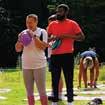



Frank steps in to make his point about the re-enactment of a medieval battle
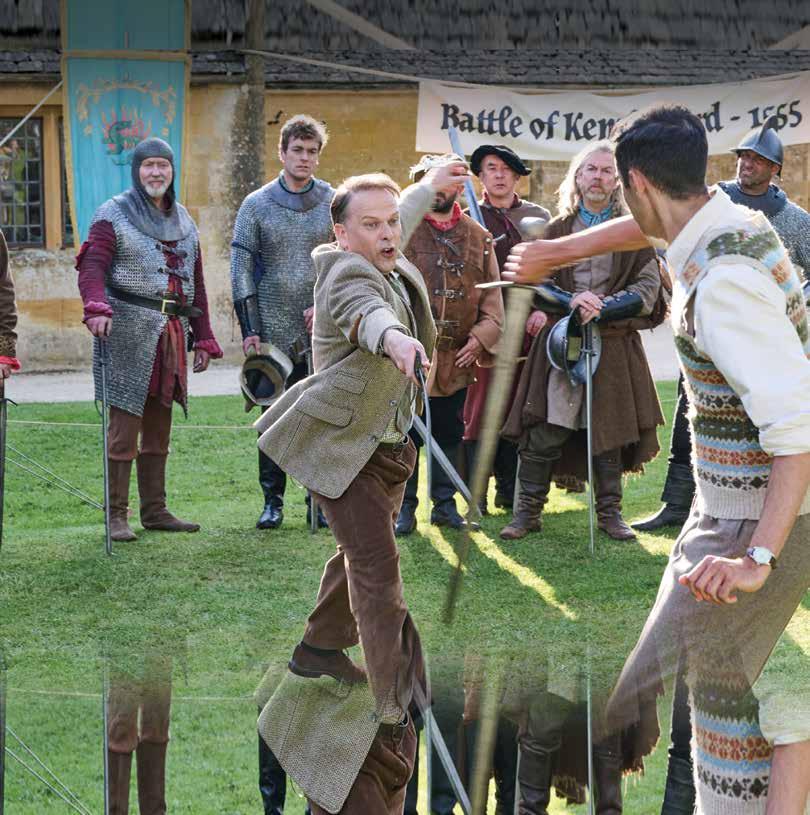
TV preview: Father Brown Fridays BBC1 and iPlayer
By Claire Brine
Let the celebrations commence! To mark the 400th anniversary of the Battle of Kembleford, villagers are planning to stage a historical re-enactment of the conflict. Pretty much everyone wants to play a part. But the day before the spectacle is due to take place, a local historian is murdered. And GK Chesterton’s fictional cleric is determined to track down the killer in the cosy-crime period drama Father Brown
The new series begins on the battlefield, with villagers rehearsing their roles as medieval combatants. While the head of the historical society, Tyrone (Richard David-Caine), is busy shouting orders at the two armies, amateur historian Frank, (Nicholas Burns) is on the sidelines, picking holes in the re-enactment.
Later, Frank spots the famous historian Alexander Manning (Luke Allen-Gale), who has turned up to promote his new book. Though the pair went to school together, it’s clear to Father Brown (Mark Williams) that Frank and Alexander are no longer friends. He wonders why.
As the battle rehearsal continues, Frank’s problems only increase. He has a heated discussion with Tyrone about the
mistakes he sees in the re-enactment, then gets into an argument with his wife Cecily (Melissa Johns). No doubt about it, Frank’s behaviour is infuriating those close to him – and Father Brown sees it all.
That night, Frank is murdered in the most medieval fashion.
High on the police’s list of suspects is Cecily. Everyone knows she argued with Frank before his death – and then the police uncover a weapon from the battlefield in her home.
Cecily is adamant that she is innocent. And only Father Brown seems to believe her. He tries to offer her words of comfort in her despair.

difficult circumstances. Maybe we feel a bit lost in the world and are desperately seeking a truth that we can hold on to.
‘I’m determined to uncover the truth,’ he says. ‘Please do not give up hope.’
A man of his word, Father Brown throws himself into the case by looking for clues as to who was to blame for Frank’s death. He assures Cecily that he won’t stop searching – not until he has found what he’s looking for.
While viewers will be keen to solve the fictional whodunnit, the reality is that many of us know what it’s like to feel clueless at times. Perhaps we wonder what life’s all about. Or we can’t make sense of our
In the eyes of Father Brown – and reallife Christians like him – the greatest truth we can ever uncover is just how much we are loved by God. When we confess to him even the worst things we have done, he is willing to forgive us. When we don’t know what to do next, he will help us find the right track. And when we face troubles, he sustains us with his peace.
The truth of God’s love can be ours if we want it. All we need to do is look for it. In the Bible, God makes a promise to those seeking him, saying: ‘You will ... find me when you seek me with all your heart’ (Jeremiah 29:13 New International Version).
The life-changing love of God is available to everyone. When we find it, there’s no greater revelation.
Interview by Sarah Olowofoyeku
One of the most common new year’s resolutions is ‘to exercise more’, but a lot of people find the habit hard to keep up. Salvation Army sports mission specialist Rob Moye has some tips as to how it can go from something we’ve written down to something that becomes a part of our life.
‘It’s important not to overdo it,’ he says, ‘but to consider doing your chosen exercise more regularly. Try to become more rhythmic in your everyday.
‘Exercise is unlimited. It could be that you live in a townhouse, so you’ll walk up the stairs 10 times. Elderly people who are on the sofa could do chairobics.

‘Start at the beginning, it’s a very good place start,’
Rob sings in Sound of Music fashion. ‘I’d say to people, ask yourself one thing you’d like to start this year –Couch to 5k, the gym, swimming, walking with other people – and begin there.
‘Find fitness that fits your life, your schedule and how you’re wired. Could you

exercise before the school run? Before going into the office, or as you go into the office?’
Rob says that the support of other people is key.
‘Tell some people that you’ve started an activity, and let them encourage you when you send a message to say you’ve done it.
‘Life is like riding a bicycle – to keep your balance, you must keep moving forward.
‘It’s a marathon, not a sprint. It’s OK not to succeed some days. Every day is a new day to start again.’
Rob speaks about exercise from experience. He runs 5k six days a

week, and his work as a sports mission specialist with The Salvation Army entails helping people combine their ‘passion for Jesus with their love for sport’.
He says: ‘At The Salvation Army we love God and love others, so we’re interested in people – the whole person, their health and their happiness. We use sport as a tool to engage with the communities that we live in.
‘Wewant to be a church without walls – and in sports mission we are. We are being an expression of God’s love and compassion, engaging with all ages in sporting arenas, green spaces and recreational grounds.
‘We support Salvation Army churches across the country in what they are doing in their areas. In Swinton in Manchester, The Salvation Army is building relationships with people at a gym café to help them with their everyday wellness. In York, an amazing guy called Charlie Malarkey is using boxing to help people in their recovery from addiction or their homelessness. A group of Salvationists in St Ives meet on the beach every Sunday for croissants and coffee – they read the Bible and they
surf. They’re engaging with the surfing community and getting to know them.
‘Many people in The Salvation Army are involved in parkrun too. They run or walk the course, they spectate and they cheer for others. It’s amazing how God is using them.
Rob also believes that there is a connection between the physical activity people are doing and their mind and spirit.
‘God has given us a body, and I think he is asking us as human beings to glorify him in the use of our bodies,’ he says. ‘We can do that by being active, being relational and enjoying life.
‘When I run, I feel God’s Spirit with me. When I get back home and have good endorphins, I feel positive in my mind. Physical activity impacts everything. If I didn’t run, I’d feel sluggish and wouldn’t be as energised. But when I do run, I have time to see God, speak to God and listen to God. There is an interconnectedness in body, mind and spirit.’
Rob sees sport as being able to play a part in tackling social problems.
‘Loneliness and isolation are through the roof at the moment,’ he says. ‘Sport can help with that, because it encourages engagement with others.’
Acknowledging that people’s negative past experiences of sports –in school, for example – can influence
them, Rob encourages people simply to get moving.
‘People can see the word “sport” and think “I’m not sporty”, but if we change the word to “exercise”, “movement” or “wellness”, so many more windows of opportunity can open up.
‘Not everybody likes to run or cycle. But ask yourself: “What do I want to do? What is going to give me the most pleasure in my everyday life?”
‘Sometimes you can start exercise and find it difficult, or beat yourself up because day two wasn’t as good as day one, or day five ended up being rubbish. But if you make movement part of your ordinary life, you can continue to build up those good habits.’
The start of the year is an opportunity to make new resolutions, one of which may be cutting down on screen time. Writer HANNAH BRENCHER tells how she went device-free for 1,000 hours and offers advice for others who want to foster a healthier relationship with technology


Alarm clock, sat-nav, camera and even bank card – and 94 per cent of the UK population own a device that functions as all of the above and more: the smartphone. But, while this piece of tech is useful, many people report feeling overwhelmed by their phone. At the start of the new year, some of those people – and others simply looking to create better habits – may have made a resolution to ‘use their phone less’.
Hannah Brencher, a lifestyle writer based in Atlanta, Georgia, used to feel overwhelmed by her phone. So, on her 33rd birthday, she decided to unplug. A few years on she has written The Unplugged Hours, in which she shares everything she learnt after reaching 1,000 digital device-free hours over a year.
The book explains how people can cultivate ‘a life of presence in a digitally connected world’.
‘I am in no way against tech,’ Hannah tells me over a video call. ‘Tech is very important. But the more that tech has come into our lives, the harder it has been to connect as humans. Rates of loneliness, anxiety and stress are skyrocketing. We need our phones to go anywhere, to do anything. Phones have become appendages to us.
‘The question that I’ve been curious about for the past decade is: is technology
a good thing or a bad thing?’
The answer, Hannah thinks, is that ‘the devices themselves are neutral’.
She explains: ‘I love social media. I’m on it as an author. I think it’s amazing that you can go on Facebook and see friends from college reaching different milestones, raising their kids. I love that my daughter can FaceTime my mum from a thousand miles away. You and I are sitting having this conversation even though we’re in different countries. Technology is great. It’s beautiful. But it’s a tool, and so it matters how we use it.’
I was overwhelmed and exhausted – my phone was the issue
Hannah tells me how she felt before she embarked upon her unplugging experiment.
‘I was overwhelmed and exhausted. That overwhelm was overstimulation in disguise, and I knew that my phone was the issue. I was checking emails at all hours of the night. When my little girl was in front of me, I was checking messages or directions.
‘It wasn’t necessarily that I wanted to throw out the phone. The question was
more about whether there was a way for me to strike a balance in my life. So I challenged myself to unplug for 1,000 hours.’
Undertaking her challenge allowed Hannah to become a more present wife and mother, feel less overwhelmed and discover a new sense of wonder about the world. As a Christian, it benefited her faith too.
‘In my moments of meeting with God, I had often been distracted,’ she says. ‘I would be wanting to get on to the next thing, or I’d go to look up a Bible verse on my phone, and that would lead me to a bunch of texts. In learning to sit in the stillness, I have become a better listener to the tasks that God has for me, and usually those things are to do with people, whether that’s making a meal for somebody or playing more with my daughter.’
Hannah has a few pieces of advice for anyone who wants to start unplugging. First, if you’re worried that you may miss an important phone call, you don’t have to turn off your phone.
‘Just grab a box and keep your phone in there or put it in another room,’ she says. ‘You can keep the ringer on so if somebody calls you, you can grab it. But the physical act of having to get the phone – of transitioning from unplugged to plugging back in – is powerful.’
Secondly, ‘invest in an alarm clock’.
Lastly Hannah advises people to ‘have a way to track your progress’.
She explains: ‘I believe that you can’t manage what you don’t measure. It doesn’t have to be an hour unplugged; it could be 15 or 30 minutes.
‘But I also had to make a shift in my mind to say to myself that I’m not off my phone because the phone is bad or because I’m bad for having these habits. I looked at each hour as a block of time to gain back, to put towards other things, whether that was being present with my family, cooking or writing. This was not an hour off the phone; this was an hour allocated back to the things that I really wanted to be doing.
‘It’s important to be kind to yourself too. You’ll have days where you don’t unplug at all. But even if it’s just an hour or two a week, those are hours you’ve claimed back.’
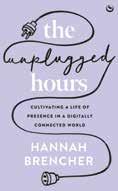

l The Unplugged Hours is published by Watkins
JENNI CALCRAFT explains why she set up Someone Cares, a ministry devoted to supporting families with members in hospital
Interview
by Emily Bright
Since undergoing skull reconstruction surgery as a baby, Jenni Calcraft’s nine-year-old son has been in and out of hospital. Each year, he attends Alder Hey Children’s Hospital in Liverpool for an average of more than 40 appointments under 24 different departments. There have been difficult times – but Jenni’s experiences have led her to set up a hospital ministry called Someone Cares.
‘My son was born with a condition called craniosynostosis, which means that his skull was fused together prematurely,’ says Jenni. ‘His skull reconstruction as a baby should have been a one-off event that he recovered from. But after that, he picked up a much longer problem list.
‘The most challenging thing for us as a family was that he developed an unsafe swallow. He became completely nil by mouth and was tube-fed at the age of two. He is now – praise God – eating and drinking normally again. But there were moments when we didn’t know which way things were going to go.
I had to release ownership of my son back to God
‘We
realised how traumatic it can be to go on a difficult health journey, and to be in hospital. It has repercussions in every aspect of life. We met a lot of
other families in similar situations. Behind every sick person in hospital, there’s usually a heartbroken and traumatised family member.’
Jenni has relied on her relationship with God to see her through her pain. It gives her a different perspective on her circumstances.
‘My faith helps me recognise that my role is to love my son, but to always acknowledge and accept that he is God’s child,’ she explains. ‘Ultimately it is God who will provide everything he needs. I’ve had to release ownership of my son back to God. That has brought me a lot of peace, which has flowed into other areas of life.’
While Jenni admits that she’d ‘give



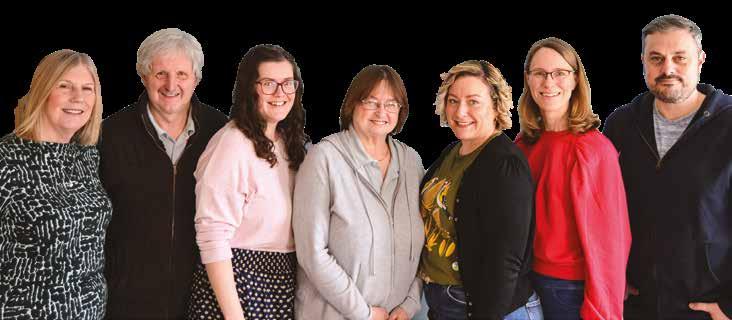
back any of the suffering we went through in a moment’, she recognises that Someone Cares wouldn’t have come into existence without it. She believes that, through her family’s experiences, God has been able to bless many more people facing similar scenarios.
‘We’ve now got hundreds of stories of God’s love at work in the hospital, and that wouldn’t have happened had we not walked this difficult journey,’ she says. ‘We also knew that God brings good out of all circumstances.
‘We can see the evidence of that in what we went through as a family. God was walking with us every step of the way. He makes us brave. My son knows that
Someone Cares has come about as a result of him. He feels positive about that.’
Jenni’s idea for the charity was prompted by a fellow parent’s cry for help.
During one hospital admission with her son, she overheard someone on the ward asking for the details of a fortune teller.
‘She was a 17-year-old single mum with a toddler and a newborn baby and was brilliant with her kids,’ Jenni recalls. ‘I understood that she wanted to have a little hope and certainty and answers about the future. It tugged at my heart. I knew, from my own experiences, the hope that can come in Jesus. I wished that I could bring that to people in hospital.
‘As a physiotherapist working on wards
in the past, I’ve had difficulty sharing my own faith in those situations, because it’s not appropriate to cross professional boundaries. Yet, in that moment when this mum was talking about fortune tellers, I prayed: “Wouldn’t it be amazing if we could bring God’s love into hospitals and bring hope, answers and comfort.” But I didn’t think it would be possible. From my own experience, it felt like clinical settings were quite closed to faith and to God.’
An answer to that particular prayer came quickly. One day Jenni felt prompted
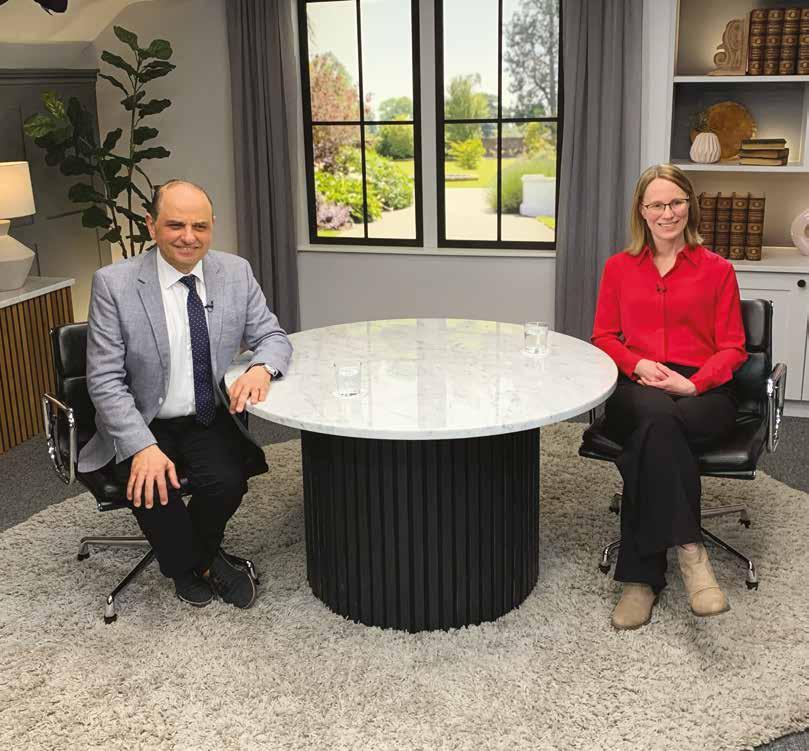
From page 9
to visit the chaplaincy team and ask whether she could provide any practical support. They welcomed her offer, sparking the idea for Someone Cares, a charity which ministers to families at Alder Hey Children’s Hospital. It works in partnership with Jenni’s usual place of worship, Freedom Church in Liverpool.
‘We started providing toiletry packs, which also contained information about spiritual care at the hospital, and a card so that people could contact us at the church and ask for prayer,’ she says. ‘They were given out in the emergency department to families who were being admitted.
‘From there, hospital staff started asking us to donate kids’ pyjamas. We gathered donations, packaging them and taking them in. After that, they asked about whether we would be interested in volunteering on the wards.’
Over time, Someone Cares developed an increasingly solid base of support, and its volunteers were given swipe access to every department in the hospital. Jenni outlines what their pastoral care looks like in practice.
‘We say to the nurses: “We’re from spiritual care. Does anybody need a chat, some emotional support or someone to
get alongside them?” They usually point us in the direction of people. We go in, we have a chat, we get to know them. If it feels appropriate, we ask, “Would you like us to say a prayer?”, and 9 times out of 10 people say yes.
‘A lot of times people say, “I’ve been praying myself” or “This has made me think about God” or “I’ve seen an answer to my prayer.” It’s wonderful to be God’s feet on the ground and be an answer to those people’s prayers.’
Jenni shares an example of seeing prayer being answered. It happened when she and other volunteers went round a
ward, handing out Easter books. They offered one of the mums a book, and, as they got chatting, they learnt that she’d been longing for more support and that only the day before, her mother had prayed that it would be provided.
Jenni says that the charity aims to show God’s love to people, rather than offering a healing ministry.
‘We do have a God who heals,’ she says. ‘But if we say to somebody, “What would you like prayer for?”, they’ll quite often say, “I want next week’s surgery to go well” or “I need these results to come back.” We’re able to pray that with them.
‘Very often, we see answers to those prayers. But we also explain that God loves them in all circumstances. If they don’t see healing, that doesn’t mean that God doesn’t love them. We can bring peace and comfort.’
In supporting Someone Cares, Freedom Church makes good use of its congregation’s talents.
It’s about being able to bring God’s love to people
‘Our whole church is completely behind the chaplains at Alder Hey and their work,’ says Jenni. ‘We support them in many ways, not just through the volunteers but also in the practical provision for patients and their families and by praying for the chaplaincy team and the hospital.
‘We’ve got a whole congregation of people who can offer their resources and time to the chaplains. We’ve had a graphic designer create posters for them. We’ve baked for staff. We’ve got one lady in her 80s who irons a lot of the pyjamas and packages them up for me to take into the hospital.’
Given that Someone Cares is built on a foundation of faith, there’s one particular Scripture which lies at the heart of all it does. The verse encapsulates God’s care and compassion for vulnerable people.
Jenni explains: ‘In Psalm 147:3 it says that God “heals the broken-hearted and binds up their wounds”. Essentially, that’s our motivation. It’s about being able to bring God’s love to people who are often broken-hearted in hospital, who have wounds not just physically, but emotionally too.’
When she set up the charity, Jenni prayed about her hopes for it, and she continues to do so. She felt God show her the bigger picture of what the organisation would achieve.
She says: ‘I remember when the charity began, I prayed to God about it and said: “Here’s Someone Cares, do with it what you like.” I pictured a box, and when I


opened it, it was full of A6 cards, and on every single card, there was a story. They had been taken to God in prayer. As I opened it, they all fell out and there were thousands of stories.’
In 2023, Jenni’s vision became one step closer to being realised. Someone Cares won a place on the Cinnamon Network’s incubator programme, which resources UK churches in expanding start-up social action projects. The programme has enabled Someone Cares to set up a UK hub to support churches that are looking to replicate the charity’s ministry in other localities.
With such support behind her, Jenni is optimistic about the future.
‘I get really excited by the potential of the Someone Cares, and by the fact that I have the privilege of going on an adventure with God,’ she says. ‘It’s a process of trusting in him, and where he’s going to take our work. I’m enjoying being part of that, seeing how he is developing what we’re doing.
‘Even in Alder Hey, we’ve got a couple of hundred stories that we’ve brought prayer into. The thought of thousands more stories across the country being laid before God is exciting.’
The War Cry invites readers to send in requests for prayer, including the first names of individuals and details of their circumstances, for publication. Send your Prayerlink requests to warcry@salvationarmy.org.uk or to War Cry, 1 Champion Park, London SE5 8FJ. Mark your correspondence ‘Confidential’.
There is no set formula to becoming a Christian, but many people have found saying this prayer to be a helpful first step to a relationship with God
Lord Jesus Christ,
I am truly sorry for the things I have done wrong in my life. Please forgive me. I now turn from everything that I know is wrong.
Thank you that you died on the cross for me so that I could be forgiven and set free.
Thank you that you offer me forgiveness and the gift of your Holy Spirit. Please come into my life by your Holy Spirit to be with me for ever.
Thank you, Lord Jesus. Amen

Nigel Bovey gives chapter and verse on each book of the Scriptures
The first book of the Bible, Genesis, is about origins and beginnings. It starts big. The opening chapter is an account of the creation of the world, climaxing in the creation of humankind.
In some quarters there is controversy about the passage’s relationship to contemporary scientific knowledge. But those engaging in the controversy are in danger of missing the point. This chapter is not a scientific paper. Its purpose is not to describe the ‘how’ of creation, but to point out that there is a ‘who’ behind creation. It says that creation has a Creator.
God considered that everything he had made was ‘very good’ (1:31), but, through the story of Adam and Eve, the book’s third chapter narrates the introduction of sin into the world and the fall of humankind. Arguments over the historicity of the couple and the existence of a talking serpent again miss the point. The story’s punchline is that humankind has fallen short of what God intended it to be.
Because of human wickedness, much of humankind is lost to the Flood (chapters 7 and 8). A new society is rebuilt through Noah.
The origin of the world’s languages is told in the story of the Tower of Babel (chapter 11). The source of the nation of Israel is found a chapter later, where God calls Abram to leave his home in Ur of the Chaldees (in modern-day Iraq) and to start a new life in Canaan (modern-day Lebanon, Syria, Israel and Jordan).
God then offers Abram, his family and descendants a new covenant. He promises to be their God (17:7). As a sign of acceptance, the renamed Abraham and all male descendants are to be circumcised (17:11–14).

It is to Abraham’s sons Ishmael and Isaac that some trace the source of the present-day Israeli-Palestinian conflict.
After Abraham’s death (chapter 25), the remaining chapters chronicle the lives of Isaac, his son Jacob and Jacob’s 12 sons, including the stylishly coated Joseph, as they live in a new land.
By the end of Genesis, the Hebrew people are faced with famine in Canaan and move to Egypt for yet another new beginning.

To receive basic reading about Christianity and information about The Salvation Army, complete this coupon and send it to
War Cry 1 Champion Park London SE5 8FJ
Or email your name and postal address to warcry@salvationarmy.org.uk


1 2 3 4 5 6
Who hosts the podcast The Rest is Politics with Alastair Campbell?
Which former footballer is the author of Last Boy of ’66, a memoir about his time as a member of England’s World Cup-winning team?
Istanbul and Antalya are cities in which country?
What was Cliff Richard’s first hit single?
Who plays the lead role of Elphaba in the film Wicked?
In what decade was the sitcom Red Dwarf first broadcast?

It’s 75 years since a classic children’s radio show began
Feature
‘Aby Sarah Olowofoyeku
re you sitting comfortably? Then I’ll begin.’ The radio programme that introduced this phrase to the English language was first broadcast 75 years ago. The words have gone on to become a recognisable way of letting children know that it’s time to listen – and it brings many adults the comforting memory of childhood story times.
The BBC programme Listen With Mother was first heard on 16 January 1950. It featured nursery rhymes, stories and music for children under the age of five, and ended with the ‘Berceuse’ from Fauré’s ‘Dolly Suite’. The 15-minute programme was originally broadcast at 1.45pm, when it was thought that children were ready to concentrate after lunch and that mothers would have time to sit with them.
Listen with Mother developed quite a following and, after it was announced in 1982 that the programme was ending, MPs and celebrities supported a petition opposing the plan, and a letter of protest from concerned professors of education was delivered to Downing Street.
Perhaps its popularity was due to the intimate tone adopted by the presenters, which was uncommon when it began. Over the years Daphne Oxenford, Julia Lang and Dorothy Smith spoke on the airwaves as if talking to each child personally.
It was Julia Lang who, in an ad-lib, first asked listeners, ‘Are you sitting comfortably? Then I’ll begin.’ And, though Listen with Mother has ended, the phrase has lived on in people’s memories – appearing in headlines and book titles, and featuring in The Roly Mo Show on CBeebies for another generation of children.
What has also lived on is the use of music and stories as a teaching method. In fact, this method pre-dates the BBC’s programming. The Bible records how, thousands of years ago, God told people to use stories and songs to pass on messages to their children about what he had done for them.
God also spoke to people of all ages personally, and he still does today through the Bible. Whether we listen to its stories or read them for ourselves, we can hear the comforting truth that God wants to teach us: he loves us, listens to us and wants to be with us throughout our lives.

ACROSS
1. Polite (5)
5. Waste (5)
8. Dwelling (5)
9. Motorised bicycle (5)
10. Period (5)
11. Of the moon (5)
12. Three feet (4)
15. Silly (6)
17. Secret store (5)
18. Noisier (6)
20. Not closed (4)
25. Molar (5)
26. Farewell (5)
27. Awaken (5)
28. Reminiscent of the past (5)
29. All (5)
30. Cereal plant (5) DOWN
1. Obey (6)
2. Steam (6)
3. Utensil (5)
4. Discovered (5)
5. Conceal (7)
6. Regain (6)

7. Skinned (6)
13. Fuss (3)

14. Golf term (3)
15. Bashful (3)
16. Rage (3)
17. Hundred (7) 18. Find (6)


Each solution starts on the coloured cell and reads clockwise round the number
1. Support for head while sleeping
2. Take small bites
3. Brass instrument
4. Large spotted cat
5. Savoury flan
6. Small beetle
19. Referee (6) 21. Scrutinise (6) 22. Best (6) 23. Value (5)
Hurl (5)
O M B
Look up, down, forwards, backwards and diagonally on the grid to find these words associated with exercise



For the filling
400g sweet potato, peeled and cubed
300g cauliflower, broken into small florets
20ml vegetable oil
100g onion, finely chopped
2 garlic cloves, finely chopped
40g tikka masala paste
200g can chickpeas
200ml can coconut milk
200g can chopped tomatoes
100g fresh or frozen spinach
10g fresh coriander, finely chopped
10g cumin seeds
Salt, to taste
For the pastry
800g plain flour
400g margarine
Salt
Preheat the oven to 170C/Gas Mark 3.





Lightly steam the sweet potato and cauliflower until just tender.
To make the filling, heat the oil in a large pan over a medium heat and fry the onions for 5 minutes. Add the garlic and cook for 2 minutes. Add the tikka masala paste and stir well, continuing to cook for a few more minutes.
Drain the chickpeas into a bowl, reserving the liquid. Add the chickpeas to the pan along with the coconut milk, tomatoes, spinach and coriander, then stir well. Bring to the boil and simmer for 10 minutes.
Add the sweet potato and cauliflower and cook for another 10 minutes. Season to taste.
To make the pastry, rub the flour and margarine together in a bowl to create a breadcrumb texture. Add a pinch of salt and enough water to form a dough.
Roll out two thirds of the pastry and use a small bowl or pastry cutter to cut 6 rounds and use them to line the holes of a 6-cup muffin tin, with a little lip above the top of each hole.
Split the curry filling evenly between the pastry cases.
Roll out the remaining pastry to about 3mm thickness, then cut out 6 rounds to make the pie lids. Place a lid on each pie and crimp along the overlap of the pastry case to seal.
Brush with the reserved chickpea water and sprinkle with cumin seeds.
Place in the oven for 30-40 minutes, until the pastry is crisp and golden and the filling is piping hot. Serve immediately.

